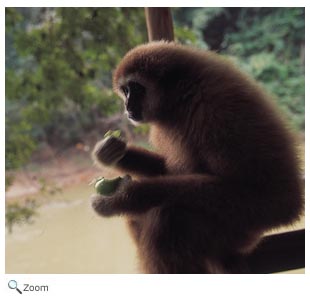Hylobatidae - gibbons,
siamangs
 There are 11 species in this family. They are found in tropical forests in
southeastern
Asia. They have very long arms, long fingers, and no tails. They are brown, gray, or black. Some species have white fur on their faces, hands, and feet. Some species have a throat sac that expands when they call out. Males and females are the same size. There are 11 species in this family. They are found in tropical forests in
southeastern
Asia. They have very long arms, long fingers, and no tails. They are brown, gray, or black. Some species have white fur on their faces, hands, and feet. Some species have a throat sac that expands when they call out. Males and females are the same size.
Gibbons and siamangs are active during the day and move among the trees by swinging from branch to branch. When they have to walk, the walk on their legs and raise their arms over their heads! Sometimes they use their arms like crutches and swing their legs to move.
They are omnivores and live in family groups. They are very vocal and territorial. Their loud booming call can often be heard miles away.
World Status Key
 Least Concern Least Concern  Near Threatened Near Threatened  Vulnerable Vulnerable  Endangered Endangered  Critically Endangered Critically Endangered  Extinct in Wild Extinct in Wild  Extinct Extinct
Status taken from ICUN Redlist. If no status is listed, there is not enough data to establish status, or there is no status data for the species.
US Status Key
 Threatened in US Threatened in US  Threatened in NH Threatened in NH  Endangered in US Endangered in US  Endangered in NH Endangered in NH  Introduced Introduced
Status taken from US Fish and Wildlife and NH Fish and Game
New Hampshire Species |
|
North/Central American Species |
| None |
|
None |
Additional Information Resource Key
 Profile Profile  Photos Photos  Video Video  Audio Audio
Agile Gibbon - Hylobates agilis   
The bonobo is the Democratic Republic of the Congo.
Source: Arkive Intended Audience: General Reading Level: Middle School
Black Crested Gibbon - Nomascus concolor    
The bonobo is the Democratic Republic of the Congo.
Source: Arkive Intended Audience: General Reading Level: Middle School Bornean White-bearded Gibbon - Hylobates albibarbis   
The bonobo is the Democratic Republic of the Congo.
Source: Arkive Intended Audience: General Reading Level: Middle School
Cao-vit Crested Gibbon - Nomascus nasutus   
The bonobo is the Democratic Republic of the Congo.
Source: Arkive Intended Audience: General Reading Level: Middle School
Eastern Hoolock Gibbon - Hoolock leuconedys   
The bonobo is the Democratic Republic of the Congo.
Source: Arkive Intended Audience: General Reading Level: Middle School Hainan Gibbon - Nomascus hainanus   
The Bornean orangutan is found in Indonesia and Malaysia.
Source: Arkive Intended Audience: General Reading Level: Middle School
Kloss's Gibbon - Hylobates klossii     
The Bornean orangutan is found in Indonesia and Malaysia.
Source: Arkive Intended Audience: General Reading Level: Middle School
Lar Gibbon - Hylobates lar     
The Bornean orangutan is found in Indonesia and Malaysia.
Source: Arkive Intended Audience: General Reading Level: Middle School
Müller's Bornean Gibbon - Hylobates muelleri r    
The Bornean orangutan is found in Indonesia and Malaysia.
Source: Arkive Intended Audience: General Reading Level: Middle School
Pileated Gibbon - Hylobates pileatus    
The Bornean orangutan is found in Indonesia and Malaysia.
Source: Arkive Intended Audience: General Reading Level: Middle School
Red-cheeked Gibbon - Nomascus gabriellae   
The Bornean orangutan is found in Indonesia and Malaysia.
Source: Arkive Intended Audience: General Reading Level: Middle School Silvery Javan Gibbon - Hylobates moloch     
The Bornean orangutan is found in Indonesia and Malaysia.
Source: Arkive Intended Audience: General Reading Level: Middle School
Siamang - Symphalangus syndactylus    
The Bornean orangutan is found in Indonesia and Malaysia.
Source: Arkive Intended Audience: General Reading Level: Middle School
Southern White-cheeked Gibbon - Nomascus siki    
The Bornean orangutan is found in Indonesia and Malaysia.
Source: Arkive Intended Audience: General Reading Level: Middle School
Western Hoolock Gibbon - Hoolock hoolock     
The Bornean orangutan is found in Indonesia and Malaysia.
Source: Arkive Intended Audience: General Reading Level: Middle School |

